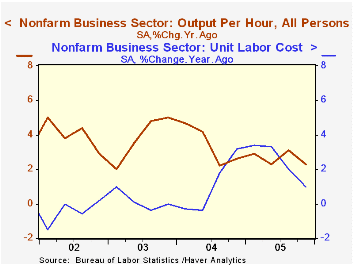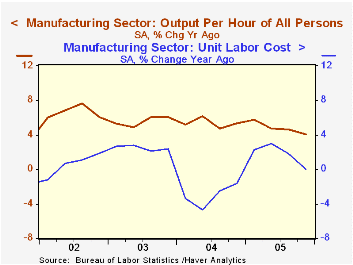 Global| Feb 02 2006
Global| Feb 02 2006U.S. Productivity Fell During 4Q '05
by:Tom Moeller
|in:Economy in Brief
Summary
Non-farm labor productivity fell last quarter after a revised 4.5% increase during 3Q. It was the first decline in output per hour since 1Q '01 and followed an average gain of 3.7% during the prior ten quarters. Consensus expectations [...]

Non-farm labor productivity fell last quarter after a revised 4.5% increase during 3Q. It was the first decline in output per hour since 1Q '01 and followed an average gain of 3.7% during the prior ten quarters. Consensus expectations had been for a 1.5% increase.
Slower output growth accounted for the drop in productivity. The marked slowdown in output to 0.9% (3.6% y/y) from 4.7% during 3Q was accompanied by an acceleration in hours worked to 1.5% (1.2% y/y) from 0.1%.
Compensation costs rose 2.8% after an upwardly revised 3Q increase. As a result, unit labor costs rose 3.5%, the quickest gain in a year.
Factory sector productivity growth rose a firm 3.9% (4.1% y/y) during 4Q following a 3.7% gain during 3Q. Compensation growth slowed to 1.9% (4.1% y/y) from 3.7% and unit labor costs in the factory sector fell 1.9% (0.0% y/y) as a result.
The implicit price deflator for the nonfarm business sector rose 3.2% (3.1% y/y). Since the increase trailed the rise in costs, the ratio of prices to unit labor costs slipped from the record high of the prior quarter. During the last ten years there has been a 60% correlation between the ratio and the y/y growth in operating corporate profits.
| Non-farm Business Sector (SAAR) | 4Q '05 | 3Q '05 | Y/Y | 2005 | 2004 | 2003 |
|---|---|---|---|---|---|---|
| Output per Hour | -0.6% | 4.5% | 2.3% | 2.7% | 3.4% | 3.8% |
| Compensation | 2.8% | 4.1% | 3.3% | 5.2% | 4.5% | 4.0% |
| Unit Labor Costs | 3.5% | -0.5% | 1.0% | 2.4% | 1.1% | 0.2% |
Tom Moeller
AuthorMore in Author Profile »Prior to joining Haver Analytics in 2000, Mr. Moeller worked as the Economist at Chancellor Capital Management from 1985 to 1999. There, he developed comprehensive economic forecasts and interpreted economic data for equity and fixed income portfolio managers. Also at Chancellor, Mr. Moeller worked as an equity analyst and was responsible for researching and rating companies in the economically sensitive automobile and housing industries for investment in Chancellor’s equity portfolio. Prior to joining Chancellor, Mr. Moeller was an Economist at Citibank from 1979 to 1984. He also analyzed pricing behavior in the metals industry for the Council on Wage and Price Stability in Washington, D.C. In 1999, Mr. Moeller received the award for most accurate forecast from the Forecasters' Club of New York. From 1990 to 1992 he was President of the New York Association for Business Economists. Mr. Moeller earned an M.B.A. in Finance from Fordham University, where he graduated in 1987. He holds a Bachelor of Arts in Economics from George Washington University.
More Economy in Brief
 Global| Feb 05 2026
Global| Feb 05 2026Charts of the Week: Balanced Policy, Resilient Data and AI Narratives
by:Andrew Cates






